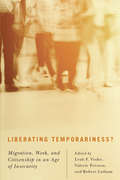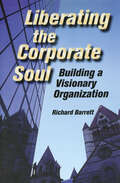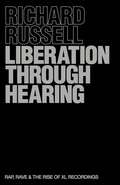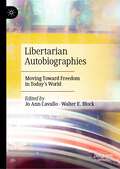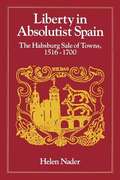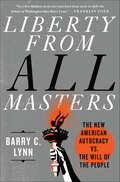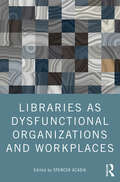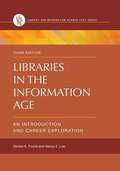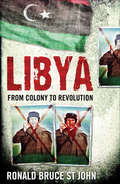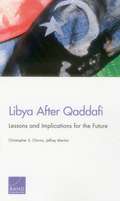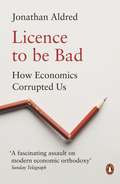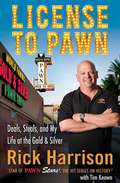- Table View
- List View
Liberating Temporariness?
by Robert Latham Leah F Vosko Valerie PrestonLiberating Temporariness? explores the complex ways in which temporariness is being institutionalized as a condition of life for a growing number of people worldwide. The collection emphasizes contemporary developments, but also provides historical context on nation-state membership as the fundamental means for accessing rights in an era of expanding temporariness - in recognition of why pathways to permanence remain so compelling. Through empirical and theoretical analysis, contributors explore various dimensions of temporariness, especially as it relates to the legal status of migrants and refugees, to the spread of precarious employment, and to limitations on social rights. While the focus is on Canada, a number of chapters investigate and contrast developments in Canada with those in Europe as well as Australia and the United States. Together, these essays reveal changing and enduring temporariness at local, regional, national, transnational, and global levels, and in different domains, such as health care, language programs, and security. The question at the heart of this collection is whether temporariness can be liberated from current constraints. While not denying the desirability of permanence for migrants and labourers, Liberating Temporariness? presents alternative possibilities of security and liberation.
Liberating Temporariness?: Migration, Work, and Citizenship in an Age of Insecurity
by Robert Latham Valerie Preston Leah F. VoskoLiberating Temporariness? explores the complex ways in which temporariness is being institutionalized as a condition of life for a growing number of people worldwide. The collection emphasizes contemporary developments, but also provides historical context on nation-state membership as the fundamental means for accessing rights in an era of expanding temporariness - in recognition of why pathways to permanence remain so compelling. Through empirical and theoretical analysis, contributors explore various dimensions of temporariness, especially as it relates to the legal status of migrants and refugees, to the spread of precarious employment, and to limitations on social rights. While the focus is on Canada, a number of chapters investigate and contrast developments in Canada with those in Europe as well as Australia and the United States. Together, these essays reveal changing and enduring temporariness at local, regional, national, transnational, and global levels, and in different domains, such as health care, language programs, and security. The question at the heart of this collection is whether temporariness can be liberated from current constraints. While not denying the desirability of permanence for migrants and labourers, Liberating Temporariness? presents alternative possibilities of security and liberation.
Liberating the Corporate Soul: Building A Visionary Organization
by Richard BarrettThe two most critical issues for business today, according to CEO's Barrett has worked with, are: "How to tap the deepest levels of creativity and the highest levels of productivity of our employees." In a world where competition has become global, successful companies are learning to build competitive advantage through their human capital. In the 21st Century, even that will not be enough. Success will also hinge on whether, in the eyes of the employees and society-at-large, the organization is a trusted member of the community and a good global citizen. Developing a values-driven approach to business is quickly becoming essential for financial success. Who you are and what you stand for are becoming just as important as what you sell. "More than simply a majestic vision, Richard Barrett's book brilliantly describes the ways and means for business leaders to create the compassionate and viable future we urgently need on our beautiful planet."-Godric E.S. Bader, F.R.S.A., Life President, Scott Bader Commonwealth Ltd."If every corporate executive bought this book and assigned it for in-house management development courses, the world would become a better place."-Hazel Henderson, author, Building a Win-Win World and Creating Alternative Futures"As we approach the new Millennium the world seeks clear thinkers with visionary concepts to help unravel the challenges before us. Richard Barrett's inspiring new book Liberating the Corporate Soul weaves a rich tapestry balancing heart and soul with a practical down-to-earth corporate vision for the future." -Craig and Patricia Neal, Co-Founders, Heartland Institute "Liberating the Corporate Soul presents a convincing rationale for making ethical and socially responsible behavior the best foundation for building and maintaining a high performance, globally successful business."-Robert W. MacGregor, President, Minnesota Center for Corporate Responsibility"Liberating the Corporate Soul gives a powerful set of tools for organizational transformation. I highly recommend it."-Ann Svendsen, Consultant and author of The Stakeholder Strategy: Profiting from Collaborative Business Relationships"Practical advice to tap the source of creativity and innovation which every business seeks."-Ron Nahser, President and CEO of The Nahser Agency/Advertising, Chicago"The bold, practical blueprint we need for moving business to the next evolutionary level. Sweeping, brilliant a sense of the grandeur of the new paradigm of business."-Martin Rutte, President Livelihood, co-author Chicken Soup for the Soul at Work "Liberating the Corporate Soul is a must read for leaders who want to shape a government built on values, innovation, and greater efficiency."-Jody Zall Kusek, Director of Strategic Planning and Performance Management, U.S. Department of the Interior "Liberating the Corporate Soul achieves the impossible: it integrates the intangibles of ethics, vision, and consciousness into a tangible measurement system."-Marcello Palazzi, Bsc, Msc, MBA, Co-Founder and Chair, Progressio Foundation, The Netherlands"Liberating the Corporate Soul provides a paradigm shifting look at how business leaders can harness the creative potential of their staff and their organizations. The author concisely develops and explains several tools that will enable managers to create an organizational foundation that will foster alignment, accountability and strategic focus."-Tad McKeon, MBA, CPA, CQM, 1997 Senior Examiner, Malcolm Baldrige National Quality Award, co-author, Transforming Home Care: Quality, Cost and Data Management"This book has captured the true
Liberation Through Hearing
by Richard Russell'If sound is the fifth element, then Richard has nurtured and enhanced some of the most important soundwaves of our time' M.I.A'Taking us from the rap 80s to the rave 90s into the grimy 21st century, Richard Russell is a Firestarter in his own right and his story is a riveting adventure' Simon Reynolds'This memoir is required reading for anyone who cares about the recent history of British music' Gilles Peterson'Russell reveals his forensic love of music and its strategies. A fascinating read' Damon AlbarnWhen I stopped wanting things for the wrong reasons, they became possible.For almost 30 years as label boss, producer, and talent conductor at XL Recordings, Richard Russell has discovered, shaped and nurtured the artists who have rewritten the musical dictionary of the 21st century, artists like The Prodigy, The White Stripes, Adele, M.I.A., Dizzee Rascal and Giggs. Growing up in north London in thrall to the raw energy of '80s US hip hop, Russell emerged as one part of rave outfit Kicks Like a Mule in 1991 at a moment when new technology enabled a truly punk aesthetic on the fledgling free party scene. For most of the 90s identified with breakbeat and hardcore, Russell's stewardship at the label was always uncompromising and open to radical influences rather than conventional business decisions.Liberation through Hearing tells the remarkable story of XL Recordings and their three decades on the frontline of innovation in music; the eclectic chorus of artists who came to define the label's unique aesthetic, and Russell's own story; his highs and lows steering the fortunes of an independent label in a rapidly changing industry, his celebrated work with Bobby Womack and Gil Scot Heron on their late-career masterpieces, and his own development as a musician in Everything is Recorded.Always searching for new sounds and new truths, Liberation through Hearing is a portrait of a man who believes in the spiritual power of music to change reality. It is also the story of a label that refused to be categorised by genre and in the process cut an idiosyncratic groove which was often underground in feel but mainstream in impact.
Liberation Through Hearing
by Richard Russell'If sound is the fifth element, then Richard has nurtured and enhanced some of the most important soundwaves of our time' M.I.A'Taking us from the rap 80s to the rave 90s into the grimy 21st century, Richard Russell is a Firestarter in his own right and his story is a riveting adventure' Simon Reynolds'This memoir is required reading for anyone who cares about the recent history of British music' Gilles Peterson'Russell reveals his forensic love of music and its strategies. A fascinating read' Damon AlbarnWhen I stopped wanting things for the wrong reasons, they became possible.For almost 30 years as label boss, producer, and talent conductor at XL Recordings, Richard Russell has discovered, shaped and nurtured the artists who have rewritten the musical dictionary of the 21st century, artists like The Prodigy, The White Stripes, Adele, M.I.A., Dizzee Rascal and Giggs. Growing up in north London in thrall to the raw energy of '80s US hip hop, Russell emerged as one part of rave outfit Kicks Like a Mule in 1991 at a moment when new technology enabled a truly punk aesthetic on the fledgling free party scene. For most of the 90s identified with breakbeat and hardcore, Russell's stewardship at the label was always uncompromising and open to radical influences rather than conventional business decisions.Liberation through Hearing tells the remarkable story of XL Recordings and their three decades on the frontline of innovation in music; the eclectic chorus of artists who came to define the label's unique aesthetic, and Russell's own story; his highs and lows steering the fortunes of an independent label in a rapidly changing industry, his celebrated work with Bobby Womack and Gil Scot Heron on their late-career masterpieces, and his own development as a musician in Everything is Recorded.Always searching for new sounds and new truths, Liberation through Hearing is a portrait of a man who believes in the spiritual power of music to change reality. It is also the story of a label that refused to be categorised by genre and in the process cut an idiosyncratic groove which was often underground in feel but mainstream in impact.
Liberdade Financeira em Dois Passos
by Agustin Grau Rosane BujesO livro trata de um método simples, porém comprovado para gerar renda passiva e alcancar a liberdade financeira. É o método que eu pratico há 20 anos, período em que sou financeiramente livre. O livro tem 3 partes: - Conceitos gerais e minha narrativa pessoal; - Passo 1 - Como ganhar renda passiva, mesmo sem ter nenhum dinheiro para investir; - Passo - Como investir o dinheiro que você ganhou antes; As pessoas que leram o livro, em sua avaliacao, dizem ser um livro muito fácil de ler e colocar em prática. Desta forma, você poderá se certificar se eu pratico o que escrevo e digo.
Liberia
by Eric Werker Jasmina BeganovicFrom 1989 to 2003 civil war raged in Liberia, causing GDP per capita to drop an unprecedented 90% from peak to trough. The roots of Liberia's conflict and economic decline are complex and intertwined, resting on over a century of discriminatory elite rule and twisted by ethnic politics during a military dictatorship. By late 2011, eight years of post-conflict government have restored basic order, re-opened the country to foreign investors, and jump-started the small economy. But the country's business model may unsettle its political stability. As Africa's first democratically elected female head of state (and a recipient of the Nobel Peace Prize) Ellen Johnson Sirleaf goes into her reelection campaign for Liberia's presidency, she must decide how to keep the country on its fragile but quick recovery, sowing the seeds for peace and prosperity rather than renewed conflict.
Liberia: Report on Post-Conflict Economic Situation and Prospects for January-June 2004--Staff Report; Staff Statement; Public Information Notice on the Executive Board Discussion; and Statement by the Executive Director for Liberia
by International Monetary FundA report from the International Monetary Fund.
Libert , galit , fragilit : The Rise of Populism in France (B)
by Elena Corsi Vincent PonsSupplement
Libertarian Autobiographies: Moving Toward Freedom in Today’s World
by Jo Ann Cavallo Walter E. BlockInfluential libertarians from diverse backgrounds and professions who have worked toward a freer society across the globe share their personal and intellectual journeys, including what their lives and thoughts were before they embraced libertarianism; which people, texts, or events most inspired them; what experiences, challenges, tribulations, and achievements they have had as participants or leaders in this movement, and how this philosophy has affected their private and professional lives. The volume’s 80 contributors span the political-philosophical spectrum of libertarianism, including anarcho-capitalists, minarchists, constitutionalists, classical liberals, and thick libertarians. Their essays express different perspectives on many issues even while articulating such core principles as an appreciation for individual liberty, private property rights, the rule of law, and free enterprise. Together, they represent myriad individual journeys toward libertarianism, however defined. By bringing together a range of contemporary voices from outside the dominant left-right paradigm, this book aims to contribute to the viewpoint diversity that is crucially needed in today’s public discourse. These autobiographies not only offer compelling insights into their individual authors and the state of the world today, but may also inspire the next generation to make our society a freer one.
Liberty In Absolutist Spain: The Habsburg Sale Of Towns, 1516-1700
by Helen NaderThroughout early modern Europe, one of the most extraordinary royal fund-raising schemes was the seizure and sale of church property to finance foreign wars. The monarchs of Habsburg Spain extended these seizures to municipal property and used the revenue to maintain their empire. They sold charters of autonomy to hundreds of villages, thus converting them into towns, and sold towns to private buyers, thus increasing the number of seigniorial lords. In Hapsburg Spain, therefore, absolutism did not mean centralization. Rather, the kings invoked their absolute power to decentralize authority and allow their subjects a surprising degree of autonomy.
Liberty from All Masters: The New American Autocracy vs. the Will of the People
by Barry C. LynnBarry C. Lynn, one of America's preeminent thinkers, provides the clearest statement yet on the nature and magnitude of the political and economic dangers posed by America’s new monopolies in Liberty from All Masters."Very few thinkers in recent years have done more to shift the debate in Washington than Barry Lynn."—Franklin Foer Americans are obsessed with liberty, mad about liberty. On any day, we can tune into arguments about how much liberty we need to buy a gun or get an abortion, to marry who we want or adopt the gender we feel. We argue endlessly about liberty from regulation and observation by the state, and proudly rebel against the tyranny of course syllabi and Pandora playlists. Redesign the penny today and the motto would read “You ain’t the boss of me.”Yet Americans are only now awakening to what is perhaps the gravest domestic threat to our liberties in a century—in the form of an extreme and fast-growing concentration of economic power. Monopolists today control almost every corner of the American economy. The result is not only lower wages and higher prices, hence a concentration of wealth and power in the hands of the few. The result is also a stripping away of our liberty to work how and where we want, to launch and grow the businesses we want, to create the communities and families and lives we want. The rise of online monopolists such as Google and Amazon—designed to gather our most intimate secrets and use them to manipulate our personal and group actions—is making the problem only far worse fast. Not only have these giant corporations captured the ability to manage how we share news and ideas with one another, they increasingly enjoy the power to shape how we move and play and speak and think.
Libraries as Dysfunctional Organizations and Workplaces
by Spencer AcadiaLibraries as Dysfunctional Organizations and Workplaces expands the "dysfunctional" concept in the professional and academic LIS discourse by exposing the internal problematics of libraries, especially at the social and organizational levels. Including contributions written by LIS professionals and scholars, the book demonstrates that although many libraries do well at attending to users and managing external information they often fail at taking care of their own employees and addressing internal workplace issues. Acadia and the contributing authors explore the problem of dysfunctional libraries so that the LIS profession can come to terms with the systemic dysfunction in their institutions and begin solution-oriented progress toward new and sustainable functionality. The book analyzes the dysfunctional nature of modern libraries, while simultaneously proposing solutions to reduce and alleviate dysfunction. Through theory and application, it takes an explicit practice-based approach with the intent to inform and explain dysfunction as experienced in the library workplace at individual and structural levels and perspectives. Libraries as Dysfunctional Organizations and Workplaces brings the dysfunction discourse to the attention of LIS academics and scholars so that further theoretical and empirical research can proceed from and subsequently be addressed in library and information schools. The book will also be essential reading for librarians and LIS students currently working or preparing to work in public, college, and university libraries.
Libraries in the Information Age: An Introduction and Career Exploration (Third Edition) (Library and Information Science Text)
by Denise K. Fourie Nancy E. Loe<p>The book <i>Library Media Connection</i> cited as something "all librarians need to have on their shelves" is now thoroughly revised for today's 21st-century library environment. Covering both technology and library practices, the title has been a go-to text for librarians and library school students since 2002. <p> <li>Thoroughly revises and updates a popular text for LIS or LTA programs that can also be used in MLIS curricula and for four-year programs in library studies and information studies <li>Provides a succinct introduction to the library industry and a practical overview of the field from seasoned practitioners <li>Brings together learnings from academic, public, special, and school libraries as well as archives and historical agencies, presenting material with both depth and breadth <li>Is applicable as an introduction for library funding agencies and public library trustees or boards</li>
Libro para principiantes sobre fondos mutuos: Todo lo que necesita saber para iniciarse en los fondos mutuos
by John Border¡Su búsqueda de un libro dirigido a inversores principiantes de fondos de inversión ha terminado! ¿Ha estado buscando una manera de invertir en el mercado de valores sin tener que elegir las acciones usted mismo? Los fondos de inversión han sido mi gracia salvadora después de haberme quemado varias veces con la renta variable. Ahora estoy compartiendo mi experiencia y conocimiento con los Fondos Mutuos. En el interior encontrará: - Cómo establecer una cuenta de fondo mutuo - Factores a considerar cuando se invierte en fondos mutuos - Realizar movimientos financieros sabios - Reglamento de los fondos de inversión ¡Y más! ¡Escrito en un lenguaje fácil de entender, y cubriendo todos los aspectos básicos para comenzar!
Libya
by Ronald Bruce St JohnSkilfully navigating Libya's eventful past, this fully updated edition of Ronald Bruce St John's authoritative work includes an in-depth examination of the 2011 rebellion that finally put an end to over 40 years of Qadaffi's authoritarian rule. From early Greek settlements to the infamous Lockerbie bombing, and from the colonel's astonishing return to the international stage to the events that led to his ousting, this is an essential introduction to this turbulent land on the cusp of Africa and the Middle East.
Libya After Qaddafi: Lessons and Implications for the Future
by Christopher S. Chivvis Jeffrey MartiniThe 2011 overthrow of Libyan dictator Muammar Qaddafi by internationally backed rebel groups has left Libya's new leaders with a number of post-conflict challenges, including establishing security, building political and administrative institutions, and restarting the economy. This report assesses these challenges, the impact of the limited international role in efforts to overcome them, and possible future roles for the international community.
Libya: Selected Issues (Imf Staff Country Reports #No. 13/151)
by International Monetary Fund. Middle East and Central Asia Dept.A report from the International Monetary Fund.
Libya: Selected Issues (Imf Staff Country Reports #No. 13/151)
by International Monetary Fund. Middle East and Central Asia Dept.A report from the International Monetary Fund.
Licence to be Bad: How Economics Corrupted Us
by Jonathan Aldred'It is going to change the way in which we understand many modern debates about economics, politics, and society' Ha Joon Chang, author of 23 Things They Don't Tell You About CapitalismOver the past fifty years, the way we value what is 'good' and 'right' has changed dramatically. Behaviour that to our grandparents' generation might have seemed stupid, harmful or simply wicked now seems rational, natural, woven into the very logic of things. And, asserts Jonathan Aldred in this revelatory new book, it's economics that's to blame.Licence to be Bad tells the story of how a group of economics theorists changed our world, and how a handful of key ideas, from free-riding to Nudge, seeped into our decision-making and, indeed, almost all aspects of our lives. Aldred reveals the extraordinary hold of economics on our morals and values. Economics has corrupted us. But if this hidden transformation is so recent, it can be reversed. Licence to be Bad shows us where to begin.
License Plate Readers for Law Enforcement: Opportunities and Obstacles
by Tom Latourrette James M. Anderson Keith Gierlack Shara Williams Lauren A. Mayer Johanna ZmudBecause license plate reader (LPR) technology is relatively new in the United States, opportunities and obstacles in its use in law enforcement are still under exploration. To examine issues about this technology, RAND conducted interviews with law enforcement personnel, police officers, and others responsible for procuring, maintaining, and operating the systems.
License to Pawn: Deals, Steals, and My Life at the Gold & Silver
by Rick HarrisonIn Las Vegas, there's a family-owned business called the Gold & Silver Pawn Shop, run by three generations of the Harrison family: Rick; his son, Big Hoss; and Rick's dad, the Old Man. Now License to Pawn takes readers behind the scenes of the hit History show Pawn Stars and shares the fascinating life story of its star, Rick Harrison, and the equally intriguing story behind the shop, the customers, and the items for sale.Rick hasn't had it easy. He was a math whiz at an early age, but developed a similarly uncanny ability to find ever-deepening trouble that nearly ruined his life. With the birth of his son, he sobered up, reconnected with his dad, and they started their booming business together.License to Pawn also offers an entertaining walk through the pawn shop's history. It's a captivating look into how the Gold & Silver works, with incredible stories about the crazy customers and the one-of-a-kind items that the shop sells. Rick isn't only a businessman; he's also a historian and keen observer of human nature. For instance, did you know that pimps wear lots of jewelry for a reason? It's because if they're arrested, jewelry doesn't get confiscated like cash does, and ready money will be available for bail. Or that WWII bomber jackets and Zippo lighters can sell for a freakishly high price in Japan? Have you ever heard that the makers of Ormolu clocks, which Rick sells for as much as $15,000 apiece, frequently died before forty thanks to the mercury in the paint?Rick also reveals the items he loves so much he'll never sell. The shop has three Olympic bronze medals, a Patriots Super Bowl ring, a Samurai sword from 1490, and an original Iwo Jima battle plan. Each object has an incredible story behind it, of course. Rick shares them all, and so much more--there's an irresistible treasure trove of history behind both the Gold & Silver Pawn Shop and the life of Rick Harrison.
